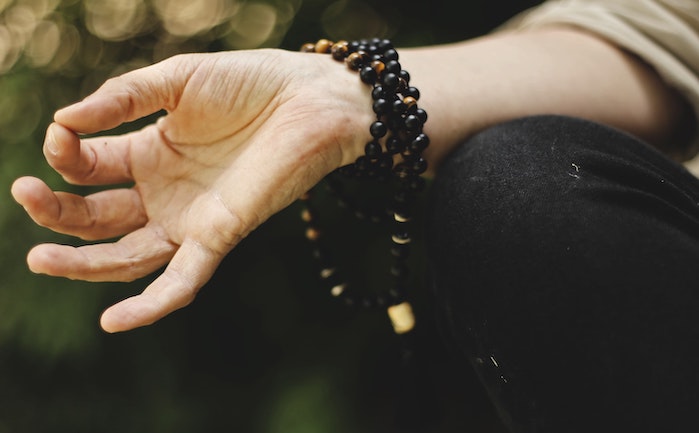
I am not a morning person. Finding a moment of mindfulness by rolling out of bed and onto my meditation cushion won’t work for me… I’ll just fall asleep on the cushion.
I’m also great at coming up with reasons not to meditate. For example, on my recent 15 minute drive to my office, I spent ten minutes debating whether or not I should meditate upon my arrival. I told myself, “It’s Friday! I want to start work early, so that I can leave early. Missing one day is not a big deal.”
I’ve been practicing meditation for over 25 years and, yep, I still have these moments. But, guess what I did when I got to my office? I got my butt on the cushion, quieted my mind, and meditated. After taking this time for myself, I was able to approach the day with a much more clear and calm mind. I know (and experience) the benefits of regular mindfulness meditation even when I’m busy making excuses.
Research on the benefits of mindfulness meditation have exploded over the past several years with a consistent stream of positive findings. Meditation can lower your blood pressure, ease anxiety and depression, help you sleep better, and actually change the wiring of your brain. So, given all the proven benefits, why do we still sometimes do mental gymnastics to avoid taking care of ourselves?
Habits aren’t formed overnight.
Any new healthy behavior takes a few months to become our new normal…and, sometimes, the full benefits may not be apparent until we have some consistent practice behind us. Consider starting small and setting small goals. Maybe even connect with one of our coaches to help you.
Sometimes it’s hard to sit and feel.
One of our primary strategies for dealing with mental and emotional discomfort is avoidance. Sometimes it’s just easier to stream a season of our favorite show, clean the entire house, or convince ourselves that a work project simply cannot wait. When something is stirring within, the last thing we want to do is stop and let it be seen and felt.
Meditation offers a kinder, more gentle way.
Honestly, meditation isn’t about exposing ourselves to pain or suffering. Mindfulness equips us with a kinder way to be with all that may be churning within us. It allows us to reclaim our innate ability to sit within the eye of a hurricane, observing but not being swept away by the winds of thought, sensations, and emotions.
When we can witness the true nature of what is going on inside of us, we discover the capacity to gently be with the experiences of our lives. We stop avoiding and start living. We discover we are far more capable of being with what life throws at us.

It’s not one size fits all.
There are many different types of meditation, so a good place to start is finding out what works best for you. Locate a place with as few distractions as possible, take a comfortable posture, and focus your attention on a mantra, the breath, an object, or whatever works best for you.
Mindfulness meditation falls into three general categories of practice.
- Formal meditation is about carving out space in your day to a dedicated practice. The duration is not as important as consistency. This allotted time (anywhere from a couple of minutes to an hour) enhances your ability to simply be more mindful. Some people prefer to listen to guided meditations, while others go it alone.
- Informal mindfulness practice can be anytime, anywhere. It’s simply taking a moment to notice what is going on in that very moment. In essence, we get out of our heads and get present in our lives…allowing us to feel the breeze on our face or relish a soothing cup of tea.
- Movement practices can be more structured like yoga or less structured like feeling our bodies in motion while we’re stretching or walking.
So, in the words of Jon Kabat-Zinn, I meditate whether I feel like it or not. Whether it’s formally, informally, or by moving my body, I practice mindfulness because it leads to big changes in how I feel.
No matter if you’re a beginner or have a well-worn cushion at home, try taking a few minutes for yourself today with one of Sanvello’s breathing exercises. We all deserve to feel the benefits of mindful meditation.

By Paul Deger, MA, LPC, PT
Mindfulness Facilitator and Product Manager, Moment Health
Paul Deger has over 30 years’ experience in healthcare. He earned his undergraduate degree in physical therapy at Marquette University. As a physical therapist, Paul has practiced in both inpatient and outpatient rehabilitation settings, specializing in neurological disorders. He furthered his studies in motor learning and control in the graduate physical therapy program at the University of Pittsburgh.
Paul then shifted focus from physical to psychological health and completed his graduate studies at Naropa University, Boulder, earning a Master’s in Mindfulness-Based Counseling Psychology. On retreat, he has also trained in Mindfulness-Based Stress Reduction with Jon Kabat-Zinn and Saki Santorelli of the Center for Mindfulness at University of Massachusetts Medical School and studied in sangha with Lloyd Burton, Dharma teacher from Spirit Rock Meditation Center. Recognizing the impact of spirituality on health, Paul more recently studied pastoral care at Iliff School of Theology in Denver.
